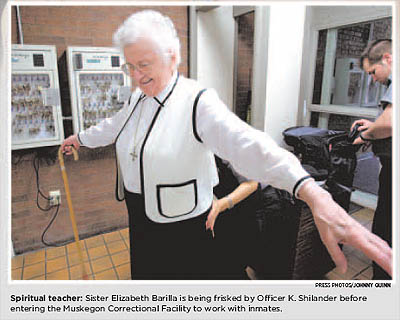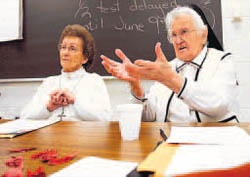
Inmates interested in Dominican Laity
Grand Rapids Dominican Brings
Message of Hope to Prison Inmates
Charles Honey
Press Religion Editor
GRAND RAPIDS, MI -- June 9, 2008 Sister Elizabeth
Barilla, 93, rolled in a wheelchair past inmates
playing basketball and raking spacious prison grounds.
A pleasant breeze blew across what looked like a
small-college campus, except for prisoners’ blue
togs and the sun glinting off razor wire.
Indeed, Sister Barilla
was on an educational mission at the Muskegon Correctional
Facility. She was impatient to arriv efor her monthly
6:15 p.m. class teaching the Bible and Catholic doctrine
to a handful of the medium-security facility’s
1,300men.
She put on her nun’s veil as a long-haired
inmate named Marc opened the door and greeted her
graciously.“Sounds like they put a playing card
in your wheel,” Marc joked about her whirring
wheelchair.He took the chair from a prison staffer
and pushed her to the classroom. She could have walked
with a cane, but at age 93, Sister Barilla gladly accepted
the ride.
It had been a long hike from the prison security
checkpoint, where she walked through a metal detector,
was patted down and held onto her veil. “They
make me take it off because they think I’m hiding
something,”she
said with a chuckle.
After almost two years of teaching there,
the Grand Rapids Dominican knows the drill well. The
former Catholic school teacher puts up with security
hassles so she can bring the gospel to convicts. “It
was Jesus Christ who came to save us and redeem us
from our plight,” she told five
class members on a recent Tuesday evening. “All
that he did for us showed the tremendous love God
has for each and every human being.“We will share
in God’s glory
someday. Isn’t that wonderful?”
She began
teaching prisoners after one of them requested a class
about Dominican spirituality. Some inmates were interested
in becoming Dominican Laity, people
who strive to live according to the Dominican values
of prayer, study, community and service. The Rev. James
Motl, promoter of Dominican Laity for the Dominican
Friars’ Central
Province, asked West Michigan’s chapter of lay
Dominicans to teach the inmates.
They began doing so
in the summer of 2006, with Sister Barilla joining
them soon after.The prisoners originally wanted to
join the Dominican Laity, but high inmate turnover
and insufficient lay volunteers made that impractical,
Motl said. However, a group of prisoners in Boston
has joined the Order, and Muskegon inmates could apply
for membership once out of prison, he added.
Bob Croft, one of about a dozen
local Dominican Laity,remembers the first time he went
to the prison with Sister Barilla. It was a windy February
day and, at that time lacking a wheelchair, she had
to stop to catch her breath while walking across the
yard.“Here’s
this woman just determined to (teach) those people
and spread the word of God,” recalled Croft,
of Grand Rapids. “It’s really quite an
amazing example."
“She’s
not afraid at all,” he added. “She has
a lot of courage and faith, and also a lot of charity
to go in there and teach them the love of God.”‘ God
sends volunteers
like her to provide most of the religious instruction
to those of the state’s 50,000 inmates who want
it, said Russ Marlan, public information officer for
the Michigan Department of Corrections.“These
volunteers that come in and do this, they’re
just god sends,” Marlan
said. “A very important part of remaining crime-free
is being around people involved in positive activities.
That begins in prison."
 |
Spiritual
teacher: Sister Elizabeth Barilla explains biblical
lessons to a class of inmates at Muskegon Correctional
Facility. Sitting on her right is Ethellynne
Niewiek, who is a volunteer. |
Sister Barilla taught
schools for more than 30 years after joining
the Grand Rapids Dominicans.The Saskatchewan, Canada,
native also taught in Hungary in the 1990s.She readily
accepted the opportunity to teach prisoners, whom she
regards as not so different from herself.
“Our guys, they’re
good guys,” said Sister Barilla, her high voice
carrying a trace of her Hungarian heritage. “You
wouldn’t
be able to tell them from an ordinary man on the street.
The biggest thing is, they realize they’ve made
a mistake and want to do better.”She relies on
fellow volunteers like Ethellynne Niewiekto teach the
basics of Dominican life.
Sister Barilla focuses on
Scripture and theology.“One fellow said to me,‘You
mean I have to forgive so and so?’” she
recalled with an amused smile. “I said,‘Yeah,
that’s what Jesus was telling us.’“I’m
just trying to teach them what a true disciple of Jesus
should be like.”She taught that in her latest
visit to Muskegon inmates.She and Niewiek had to pass
through three security gates and carry hand-held alarms
in case they had trouble. They never have had to use
them.
“Hi,
how are you sister?” a prisoner named Joseph
greeted her with a handshake and a bow. “I was
married to a Mary,” he added with a laugh. He
and a couple other class members had Bibles. Up to
20 men have been in past classes ,but several have
left after being paroled.“Instead
of saying the whole rosary today, we’ll just
say the Hail Mary because we have a lot to do,” Sister
Barilla told them. They recited with her, “Hail
Mary, full of grace,the Lord is with thee ...
”She
looked very much the teacher, sitting at a desk in
a room lined with globes, books and posters. At the
inmates’ request,
her topics were salvation, how to get to heaven and
modern Dominican saints. Beginning with Adam and Eve’s
original sin, she explained King David was “a
man after God’s own heart ”because he confessed
his sins.“We are like David,” she told
them. “We
go to God and say, ‘I have sinned, have mercy
on me.’ Then we try to do better.
”The prison
includes men serving life sentences for murder. Others
have been convicted of criminal sexual conduct, armed
robbery or drug offenses. Sister Barilla does not know
what crimes her students committed, nor does she ask.She
had the men turn to Matthew 25:31, which she called “our
final exam with Jesus."
She asked Joseph to read it.“For
I was hungry and you gave me something to eat,” Joseph
read, as Sister Barilla smiled. “I was in prison
and you came to visit me.”She then had Niewiek
handout slips of paper listing acts of mercy, such
as “visit
the sick.” The men took flame shaped “gifts
of the spirit” such as wisdom.S taying on track “We
can be practicing these gifts or works of mercy, because
it will help us on the road to heaven,” she said.
The
inmates say her classes help them daily. “It
helps to center my life alittle bit, keep me on track
where I should be,” said Marc,a soft-spoken man
who brought cups of water to the teachers. “It
reinforces theknowledge that wherever I’m at,
God’s
there.
”Steven, an immigrant from Baghdad, called
the class “a blessing” that reminds him
of church. “This is the only place I feel like
I’m in the world,” he said.Tony, who asked
for the class originally, said it will help them in
prison and beyond.“When someday we get released
back into society, we’llbe able to take all of
this with us and be good, law-abiding citizens,” he
said.
The class closed with a prayer, the men crossing themselves.
As they left, Sister Barilla said, “I
want you guys to know I pray for you every day. ”Joseph
warmly answered,“Thank you. I pray for you everyday,
and twice on Sunday.”
E-mail:
Charles Honey choney@grpress.com
